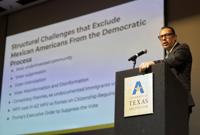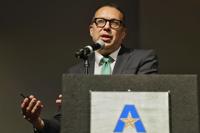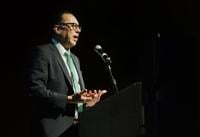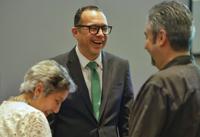
Héctor Sánchez Barba, a nationally recognized leader in Latino civic engagement, delivered the Center for Mexican American Studies’ annual Distinguished Lecture in the Bluebonnet Ballroom on Wednesday evening, bringing awareness to its community and politics.
Sánchez Barba focused his career on protecting democracy and immigrant rights while championing Latino civic engagement. His speech focused on rising anti-Mexicanidad, or anti-Mexican, sentiments across the United States and the political power that Mexican and Latino votes have.

Anti-Mexicanidad’s negative impact extends beyond any one demographic, he said.
“All of this comes with anti-Mexican policies of exclusion that become anti-immigrant. It becomes anti-Muslim. It becomes anti-anything that doesn’t ‘belong.’”

The solution, he said, is in political representation.
“Mexican Americans are the most underrepresented group in the nation in the most important spaces of power,” he said.

Sánchez Barba said organizing and empowering communities can help promote better civic engagement, but the Latino community has not achieved that yet. Almost 60% of households in the community have never received a call to help them get civically engaged.
“Working-class families that have access to the educational system, or universities, etcetera, are thoroughly excluded from the democratic process, and that’s very worrisome,” he said.

Texas, particularly, has untapped potential, with the second-largest Hispanic population, but one of the lowest investments in Latino political organizing in the country, Sánchez Barba said.
“We are the most ignored communities, particularly Mexican Americans, when it comes to everything political,” he said. “If we want to change the current situation that we’re facing as a nation, we must change the tactics we’re doing and the configuration with the political power.”

Still, Sánchez Barba feels confident in his community and said it’s important to continue empowering organizations like the Center for Mexican American Studies to keep paving the way forward. He said the more they understand the Mexican community, the better it will be for all of Congress.
“This is about opportunities, and it’s about hope. It’s about the future,” he said.



















